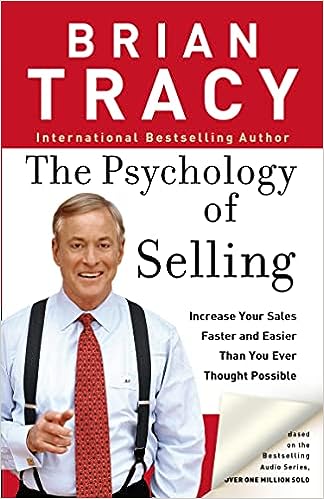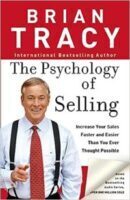Table of Contents

The well-known book “The Psychology of Selling” was authored by Brian Tracy, a well-known motivational speaker and sales guru. This book also Holds Names in “THE GUARDIAN” and “LITHUB” as having the highest sales Records offline and Online. It also has been transmitted to 16 languages & roughly used around 24 countries.
The 1985 publication “The Psychology of Selling” examines the mindset of sellers and offers helpful advice for salespeople looking to develop their abilities and advance in their professions.
Book Highlights
- Tracy highlights the significance of comprehending the reasons, aspirations, and anxieties that affect customers’ decisions.
- Salespeople may better satisfy the demands of potential consumers by adjusting their approach by understanding their psychology.
- Developing a solid connection and gaining the confidence of clients are essential for successful selling.
- The book provides strategies for making a good first impression and forming enduring bonds with clients.
- Communication that works: Tracy highlights the value of communication that works in sales.
- This entails paying attention actively, posing pertinent questions, and effectively articulating the advantages of the good or service to prospective customers.
- Managing objections: The sales process often involves objections.
- “The Psychology of Selling” offers tactics for dealing with objections constructively and utilizing them as chances to highlight the benefits of the supplied good or service.
- The ultimate objective of each sales encounter is to close the transaction. Tracy provides tips on how to close deals and insights into determining when a consumer is prepared to make a purchase.
- Personal growth for sales success: The book emphasizes the significance of personal growth for sales success. Tracy admonishes salesmen to continually better themselves by establishing objectives and keeping a positive outlook.
- Professionals in the sales industry should learn time management skills to increase efficiency.
- Time management advice is offered in “The Psychology of Selling” to assist salespeople in concentrating on high-impact tasks and hitting their sales goals.
- Overcoming a fear of rejection: Sales performance might be hampered by a fear of rejection.
- Tracy discusses this frequent issue and offers techniques for managing anxiety and keeping a positive outlook in the face of rejection.
- Selling value, not price: The book highlights the significance of selling the value of the good or service rather than simply competing on price.
- The price may be justified and customer satisfaction can be raised by outlining the advantages and benefits of the item.
- Persistence and fortitude: Sales can be difficult, and failures are frequent. Tracy encourages salespeople to keep going after setbacks and to be persistent and resilient in the face of challenges.
Sales professionals of all levels have applauded “The Psychology of Selling” for its useful guidance and doable tactics.
The book’s lessons are applicable to everyone who wishes to enhance their persuasive and communication abilities in a variety of spheres of life and business, not just those in traditional sales professions.

Download Free Audio Book
Chapter 1: The Psychology of Selling
In order to succeed both personally and professionally, Brian Tracy emphasizes the importance of sales in today’s cutthroat corporate environment.
He advances the notion that selling is essentially about comprehending and influencing human behavior and not only about providing customers with goods or services.
Tracy often explores the psychology of consumers and how their feelings, aspirations, and anxieties, play a significant part in their decision-making.
He emphasizes the value of showing clients empathy and developing a connection in order to win their trust and confidence.
The chapter may go over important psychological ideas like:
The process of making a purchase
Tracy may outline the usual steps that customers take from realizing a need to completing a purchase and how salespeople should adapt their approaches to fit these steps.
The Importance of Self-confidence
Tracy frequently highlights the need for salespeople to have self-confidence in both themselves and their goods or services.
Someone else’s confidence might influence a buyer’s confidence in a purchasing choice.
The Importance of Self- Confidence For Success
Understanding objections
Tracy may discuss the typical objections that salesmen encounter and how to properly manage them. Addressing potential clients’ questions, worries, or objections may fall under this category.
The power of persuasion
The chapter may examine several persuasive strategies, including narrative, social proof, and the reciprocity principle, to persuade customers favorably.
In general, “The Psychology of Selling”‘s first chapter serves as an introduction to the psychological components of effective salesmanship.
It lays the groundwork for the useful tips and tricks that Tracy expands on in the following chapters to assist readers in honing their sales abilities and getting greater outcomes.
Chapter 2: The Inner Game of Selling
Brian Tracy frequently emphasizes the value of attitude and mentality in the chapter “The Psychology of Selling” (chapter 2) of his book. A sample synopsis of this chapter is given below:
Brian Tracy emphasizes at the outset that one’s attitude and perspective have a significant impact on one’s ability to sell.
He contends that the cornerstone of successful marketing is an upbeat and driven mindset.
The main themes discussed in this chapter may be:
Self-Belief
Tracy talks on the significance of having self-confidence in your sales skills.
To persuade others, you must have faith in your abilities and the worth of your offering.
Positive Self-Concept
He emphasizes the notion that how you view yourself, or your self-concept, has a direct impact on how well you perform.
Your confidence and sales effectiveness may both be increased by having a solid and good self-concept.
Goal-setting
Tracy frequently promotes the establishment of definite, concrete, and doable objectives.
Setting goals might help you keep motivated and on track with your aims.
Visualization
The use of visualization methods, in which you picture yourself making sales, is frequently addressed.
This mental exercise can boost your self-assurance and lessen your worry.
Embracing Rejection
Tracy may address the anxiety that many sellers have about rejection.
He advises successful salesmen to not take rejection personally and to view it as a normal part of the process.
Continuous Learning
The chapter could place a strong emphasis on the value of continual education and self-improvement.
Successful salespeople frequently have a passion for learning and keep up with the latest sales strategies.
Managing Stress
Tracy could provide tips on how to handle stress and maintain composure under pressure.
Effective stress management is crucial since sales may be a stressful profession.
Maintaining Enthusiasm
Sales success is heavily influenced by enthusiasm.
Tracy may go through methods for sustaining and displaying excitement even under trying circumstances.
Conclusion
Typically, Chapter 2 establishes the overall tone for the book by focusing on the inside elements that are crucial to sales success.
Tracy wants to provide readers the tools they need to have a positive outlook and attitude so they may succeed in the sales industry.
Other Related Topics
- Sales Presentation
- Sales Forecasting
- Sales Quota
- Sales Management
- Sales Territories
- Salesman – Types & Functions
- Buying Motives – Types & Stages
- Market Research
- What is Salesmanship? – Full Concept
- To Sell Is Human: Review & Summary – Quick Read
- The Psychology of Selling – Quick Read
- Book Insights & Review: “How to Win Friends and Influence People”
- World Most Selling Salesmanship Books| You Must Buy
- The Most Essential Knowledge for a Salesman
- Personal Selling: Full Concept In Detail
- The Essential Qualities & Skills for a Successful Salesman
